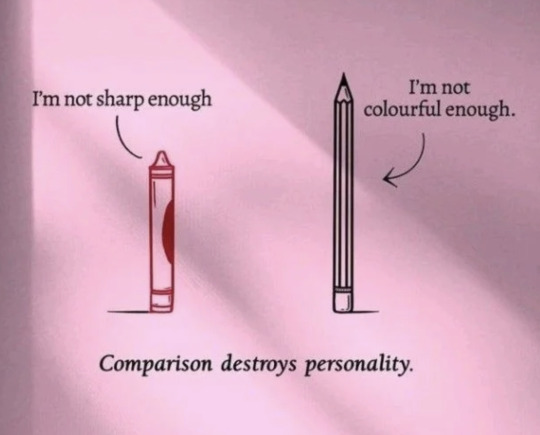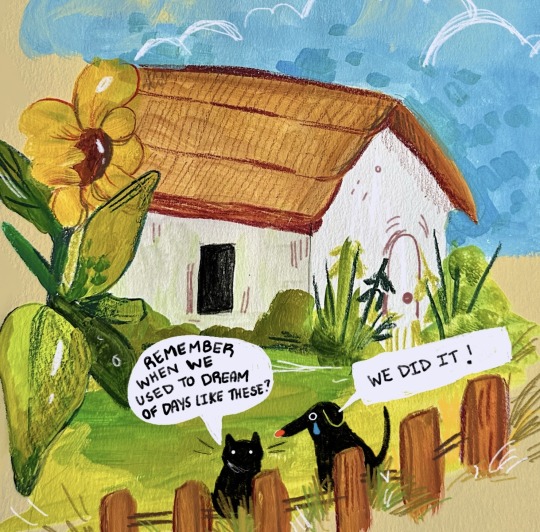Don't wanna be here? Send us removal request.
Text
youtube
Interview with the author of "Adult Children of Emotionally Immature Parents" - a book I highly recommend!
The interviewer asks her all the questions that defensive parents would use as arguments, so this video can be a real help if you feel yourself wavering because of an abuser's arguments.
57 notes
·
View notes
Text
That didn't happen. And if it did, it wasn't that bad. And if it was, that's not a big deal. And if it is, that's not my fault. And if it was, I didn't mean it. And if I did, you deserved it.
The Narcissist's Prayer (by Dayna Craig)
122 notes
·
View notes
Text

Image ID: tweet by @afrosypaella: I'm 35 and legit feel like my life is just beginning. Just saying that to all my folk in their 20s and 30s who feel like they're behind and are stressing themselves out to catch up. You're not behind. Go at your own pace. All things in time.
/end ID
I am 38 and I endorse this message. Completely correct.
635 notes
·
View notes
Text
Welp, I found a name for the kind of projection my brother was doing when he started telling people that I bullied him as a child:
DARVO is an acronym for a manipulative tactic used by perpetrators to avoid taking responsibility for harmful behavior:
Deny: The perpetrator denies that they did anything wrong, or claims that whatever happened wasn't that bad
Attack: The perpetrator attacks the credibility of their accusers, making it seem like the accusers are untrustworthy
Reverse Victim and Offender: The perpetrator tries to convince others that they are the “true” victim, and that their accuser is actually the guilty one
DARVO is a common manipulation strategy of psychological abusers, such as those who perpetrate domestic abuse. It's used to deflect blame and responsibility, and to manipulate partners into submission.
To counter DARVO, you can:
Recognize what is happening
Refocus the conversation to the victim or survivor and their needs
Educating the public about DARVO can reduce its power to destroy the victim's credibility.
#darvo#emotional abuse#mental abuse#lying#toxic relationship#it's sad tho#b/c i think he really believes it...
181 notes
·
View notes
Text
One thing I have noticed since recovering from C-PTSD is how much more in tune and cognizant of my emotions I am.
I used to be very unconscious of my emotions. But now, let's say I'm watching YouTube. I'm watching a video whose underlying message is that the world is going to shit. I'm going to notice much more quickly that my mood is turning downward, I'm getting much more anxious. I recognize that it's the video that's making me feel this way, and that it's oriented toward the negative in order to keep viewers tuned in. So I make a conscious decision to seek out some more neutral or positive-toned media to improve my mood. This is the kind of observation of my own emotions that I was incapable of just a few years ago.
I should put in a boost for the book that I think helped me the most with this, which was Being in My Body by Toni Rahman. It really helped me to see the problem, notice it when it was occurring, and train myself to pay attention to my somatic reactions to things. I can trust my gut SO much more now than I used to, I know when the vibes are off, I notice creepy people much quicker than my friends do, and I can monitor and change my behaviors that are messing with my mood. No doom-scrolling for me!
167 notes
·
View notes
Text
This website has some quizzes to see whether your romantic relationship is healthy and what to do if it isn't. If you've got some suspicions that your relationship might not be healthy or that your partner's behavior might constitute abuse, I encourage you to take the quizzes to get an objective opinion!
35 notes
·
View notes
Text
The fact that there are so many hackable nervous feedback systems in the body is absurd. We can just be like "I want to feel something different now" and twitch the right muscle like switching modes on an old digital watch. Fucking ridiculous meat machine.
22K notes
·
View notes
Text
Something that I have noticed is I know almost nobody my age that goes to a food pantry. I know people who regularly run out of money for food and in general have to eat an unsuitable diet because that’s what they can afford and they still don’t go to a food bank, im not sure if it’s because they’re embarrassed or maybe if you didn’t grow up going you don’t know much about it but if you’re financially struggling I really recommend it. And look into other options for food assistance too like community fridges and gardens and other programs that can assist you, where I live Salvation Army pays for an allotted amount of grocery delivery for low income people every month, in the summer farmers take excess produce to the library to be taken by anyone who needs it, etc. There are a LOT of resources for free food that you can look into especially if you are literally not eating because of your financial situation
51K notes
·
View notes
Photo

“Social comparison” is one of the biggest traps when it comes to our happiness and well-being. It’s important to remind yourself that you don’t measure up with anyone, because you can’t accurately compare yourself to others. Everyone is on a different path.
Learn more: Social Comparison: The Trap Behind a “Keeping Up With The Joneses” Mentality
277K notes
·
View notes
Text

Sylvia Plath, from The Unabridged Journals of Sylvia Plath
38K notes
·
View notes
Text
"It doesn’t matter how you perceive things, it’s how your child does. Don’t ever let them doubt how you feel about them."
--on a post about parents estranged from their adult children, by G1optimusprime
I love this. It's like the opposite of gaslighting. Sometimes I sit there and think, "Well, but while *I* saw this as abuse, it doesn't mean that THEY did...." But he's right: If their behavior to me was so far from good that I didn't even feel they loved me, then they failed as parents. End of.
313 notes
·
View notes
Text
Hey you know that thing you're good at? That thing you think makes you valuable? The way you are, or the thing you do, etc?
You can be and deserve to be and will be loved and cherished even without it.
You're not worthwhile because you help, or you are good at making your art, or your skills at your job. You're worthwhile inherently, as a person, even without all that.
And I want you to internalize that because otherwise there might come a day where you can't do The Thing You Think Makes You Valuable. You'll get sick and can't draw, you'll burn out and can't do your job, you'll be emotionally unable to do your regular helpfulness for whatever reason, and you'll start to feel like you have no worth anymore.
But that's not true. You have worth, you deserve comfort and companionship and happiness, and that's not a conditional thing. You deserve that, even if you can't be Useful and Productive and all that shit.
It's an easy trap to fall into to justify yourself as "well, at least I help/make art/work hard" and have that be entirely too much of your self-esteem. Being proud of your work is fine. Being proud of yourself solely through your productivity is not, because you're making it conditional. And conditional on something that can change for reasons completely outside your control!
You gotta stop thinking about it like you gotta justify the space you take up on the planet. It's great if all those things make you happy: just make sure they're not the only things that make you feel like you are justifying your existence, or you'll crater if they get taken away.
You are lovable and likable and you have value as a person and a member of society, even if you never can be productive again. You are enough.
13K notes
·
View notes
Text
There is a genuine reason why some people are always worrying (or asking) if their friends are angry with them.
"Childhood sexual and emotional abuse, and physical neglect are linked to more interpretations of neutral facial expressions as contempt and anger." --NIH
1K notes
·
View notes
Text

460 notes
·
View notes


